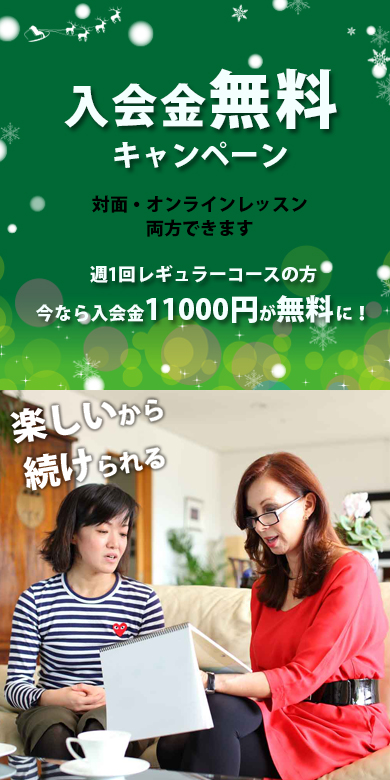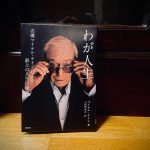接客業で学んだマネジメントと文化を英会話レッスンに活かして ブレンダン先生(千歳船橋/小田急線) ETCマンツーマン英会話
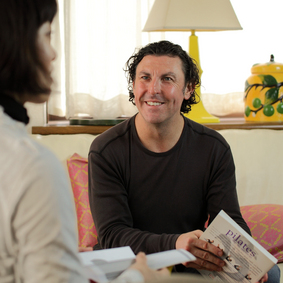
Q: お生まれはどちらですか?
オーストラリアのシドニーの郊外、マルーブラ(Maroubra)で生まれました。シドニーにある有名な海岸です。子供の頃は夏休みになるといつも友達と海岸に行き、スポーツをしたり泳いだりして遊んでいました。
I was born in Sydney Australia, in a beach suburb called Maroubra. It’s very famous beach in Sydney. So my childhood was always in summer holidays going to the beach, and playing sports, swimming and playing with friends at beach. That was my life style.
1991年、23歳の時に来日しました。箱根小涌園でウエイターとして働いていたため、日本語を学ばなければなりませんでした。日本に来る外国人の多くは、英語学校で働き始めるケースが多いのですが、そのため彼らは日本語を学ぶ必要がなく、日本人と働くこともなく、また日本人の友人もできません。私の場合はとても幸運でした。日本語、日本食、そして日本のサービスについて学ぶ機会を得られたわけですから。
Then I came to Japan, when I was 23 years old, in 1991. I worked at Hakone Kowakien as a waiter, which meant I had to learn Japanese. Many foreigners come to Japan to start to work at English school, which means they never get to learn Japanese language or they don’t get to work with Japanese people, or they don’t have any Japanese friends. So I was very lucky that I came here and got this opportunity to study Japanese language, Japanese food, and Japanese style service.
日本に1年半滞在した後、シドニーに戻りANAホテルで2年間働きました。その後、オーストラリアの航空会社に転職。1996年に二回目の来日をし、今度は4年間滞在しました。英語を教え始めたのはその時からです。初年度は、長野オリンピックに関連して、志賀高原プリンスホテルに勤めていました。
So that was for one and half years, then I went back to Sydney. At the beginning, I went to work at ANA hotel in Sydney for 2 years. And then I worked for the airline in Sydney in Australia. And then I came back to Japan for second time in 1996 and then I stayed for 4 years at that time. This time I started teaching English. First year, I was working at Prince hotel in Shiga-Kougen in Nagano for the Nagano Olympics.
Q 約14年の講師経験があるわけですね。
はい、そうです。その後、シドニーにもどり、レストランの経営を始めました。日本食レストランのマネジャーというポジションでした。その経験から、経営について多くのことを学ぶことができたため、現在では、住商、NEC、日立で、マネジメント、リーダーシップ、行動心理学について英語で教えています。
Yes. That’s right. And I went back to Sydney and started to run restaurants in Sydney. I was a Japanese restaurant manager in Sydney. Because I was able to learn a lot of information about management, so now I teach, at Sumisho, NEC and Hitachi, management, leadership, and psychology of motivation in English.
Q 日本人は多くの時間をかけて英語を学んだのにもかかわらず、実際に海外でネイティブスピーカーの英語が理解できずに、ショックを受けることがよくあります。何か良いアドバイスはありますか?
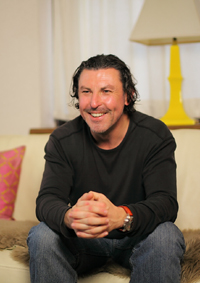 たとえば、その国で流行っている文化に焦点をあてているテレビドラマを見たり、ウェブサイトを閲覧したりして、他の国々について知識を得るよう意識したり、現在何が起きているのかを調べるように、できるだけ心がけてみてはいかがでしょうか。
たとえば、その国で流行っている文化に焦点をあてているテレビドラマを見たり、ウェブサイトを閲覧したりして、他の国々について知識を得るよう意識したり、現在何が起きているのかを調べるように、できるだけ心がけてみてはいかがでしょうか。
So try to somehow get knowledge of other countries, either by looking at dramas on TV, or reading some Web sites, which focus on that country’s popular culture, and find out what’s going on in other countries.
この質問とは逆のケースもあります。私が箱根小涌園で働いていたときのことです。オーストラリアから新しいスタッフが着任しました。彼はオーストラリア大学で4年間日本語を学んだ後に来日したのですが、ショックを受けていました。日本語が全くわからなかったのです。
It happens in the reverse as well. For example, I remember when I was working at Kowakien, we had a new Australian came. He had been studying Japanese for 4 years at Australian university in Australia, came to Japan, and was shocked, because he could not understand anything.
なぜなら、彼には実際に日本で生活をした経験がなく、日本人の友達もいませんでした。教科書から学んだだけだったのです。実際に日本で日本人の方と話すことは、教科書で学ぶのことと全く違っていました。日本人だけの問題ではないのです。逆のケースもあるのです。
Because he didn’t have the experience of actually living in Japan, and he didn’t have the experience of having Japanese friends. He learnt from a textbook. But then when he spoke to Japanese in Japan, it was completely different. So it happens in the reverse as well. It’s not just Japanese.
Q スピーキングとヒヤリングの能力を高めるにはどうしたらよいでしょうか?
スピーキングに関しては、まず自分の声に自信を持てるようになることが大切です。私の場合は、生徒さんに短い記事を渡してそれを自宅で50回読むように言います。意味がわからなくてもかまいません。とにかく大きな声を出して読んで、自分の声を聞くのです。リズムを意識して、正しいイントネーションやポーズになるように心がけ、どこを強く読むかを注意してください。やがて自分の声が聞けるようになると、今度はそれを直したり調整したりできるので、自信が出てきます。また、読みながら自分の声を聞いているので、ヒヤリングの練習にもなっているわけです。一石二鳥ですね。
For speaking, first of all, it’s important to be able to be confident with your own voice. So what I tell students to do is, I give them a small article, “go home and read it 50 times aloud in your own voice.” And even if you don’t understand the meaning, just read it and listen to your voice, and try to find out the rhythm, and try to get the intonation correct, and the pauses correct. Try to find out where English stress is. And when you hear your own voice, you get very confident, because you can change it and try to adjust it. Now when you read an article, you are hearing your own voice. So that helps your hearing as well. It’s very interactive.
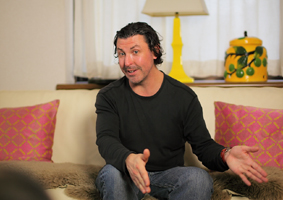 よりレベルの高い生徒さんは、英語のテレビドラマをご覧になってみてはいかがでしょう。ドラマは週一で見ることができますし、そのドラマ自体に本当に夢中になってしまうこともあるので効果的です。辞書を用意して、テレビの前に座り、そのドラマを繰り返し聞くのです。そして、ある単語を聞き取れたけれども、意味がわからないときは、すぐに辞書で調べるのです。
よりレベルの高い生徒さんは、英語のテレビドラマをご覧になってみてはいかがでしょう。ドラマは週一で見ることができますし、そのドラマ自体に本当に夢中になってしまうこともあるので効果的です。辞書を用意して、テレビの前に座り、そのドラマを繰り返し聞くのです。そして、ある単語を聞き取れたけれども、意味がわからないときは、すぐに辞書で調べるのです。
I am thinking about, people at a higher level, try to see some English TV drama. A drama can be effective, because you can watch it every week, and actually get very interested in the drama. You can sit in front of the TV with a dictionary and just listen to it over and over again. And if you hear a word and recognize the word, but you don’t know the meaning, look it up straight away.
これは私自身が日本に来たときに行った勉強方なのです。最初に私が見た番組は『ねるとん紅鯨団』。とても面白い番組でした。この番組は、日本語の基本的な表現をすべて私に教えてくれました。辞書を片手にテレビを見ていると、「よろしくおねがいします」という意味がわからず、すぐに調べてみました。それは、私に日本語の挨拶の仕方を教えてくれました。番組自体も面白く、生の人間が生の言葉で話しているので、日本語を学ぶには最適な番組でした。
When I first came to Japan, that’s what I did. And the first show I watched was “ねるとん紅鯨団”, because it was very funny. It taught me all the basic things of Japanese language. I sat in front of the TV with the dictionary and I didn’t know what “よろしくおねがします” was. I looked it up and it taught me how to do a greeting in Japanese. And also that was a perfect show, because that was real people doing real life talking. It was funny and interesting.
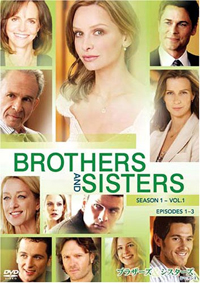 良いドラマがたくさんあります。妻のお気に入りは、『ブラザーズ& シスターズ』。日本人の妻はこんなことを言っていました。「すでに4ヶ月見ているけど、リスニングが少し良くなってきた」と。彼女がそのドラマを本当に楽しんでいるからだと思います。
良いドラマがたくさんあります。妻のお気に入りは、『ブラザーズ& シスターズ』。日本人の妻はこんなことを言っていました。「すでに4ヶ月見ているけど、リスニングが少し良くなってきた」と。彼女がそのドラマを本当に楽しんでいるからだと思います。
There’re many good dramas, like one called “Brothers and Sisters”, which is about a family. My Japanese wife likes it. She said, “I’ve been watching “Brothers and Sisters” for 4 months, I’ve noticed any improvement in my listening,” because she really enjoys the drama.
面白いとか、夢中になれるとか、好きな男優や女優が出演しているとか、あなたが本当に入り込めるドラマを見つけて、ご覧になってください。そして、最初から内容を100%理解しようとしないことです。目標は70%。最初は3割くらいから始めて、そして5割。7割以上わかるようになれば、あなたはかなり上達しているでしょう。
So I suggest somehow try to find a drama that you get some enjoyment, or passion for, or you really like that actress or that actor. And you can really get involved in that dram and just watch it. And don’t try to look for 100%, but your goal is 70%. If you try to understand 100%, people loose their confidence. Always go for 30% at the beginning, then 50%. And if you get more than 70%, you’re going well.
Q 先生の英語は発音、アクセントなど癖がなく、とてもわかりやすいのですが、スタンダードな英語を話すように意識をされているのですか?
シドニーでは多くの方がこのような話し方をしています。シドニーは現在では様々な文化が集結しているオーストラリアの国際ビジネスの中心都市ですから。また、私がホテル業、レストラン業などの接客業に従事していたため、わかりやすく話す必要があったこともあります。よく日本人の方から、彼らのために私が話し方を変えていると思われることがありますが、これが私の通常のしゃべり方です。
In Sydney, a lot of people speak like this, because it’s a very international business center of Australia, and it’s now such a mixture of cultures. Also I was working for hotels and restaurants, which meant I had to speak clearly. Many Japanese think I am changing my voice for them, but this is my normal voice.
ところで、オーストラリアはとても面白い国です。若すぎる国なのです。たとえば、日本では、方言をしゃべると、その方が秋田出身なのか山口出身なのかがすぐにわかりますね。でも、オーストラリアには方言がないのです。オーストラリアの5つ別々の地域から来た5人のオーストラリア人がいたとしても、「彼らはシドニー出身で、彼はメルボン出身」などと判断することはとても難しいのです。彼らの英語には、ほとんど違いがないのです。
And an interesting thing about Australia is it’s too young. For example, in Japan, if somebody comes from Akita or Yamaguchi, you know straight away, if they speak their dialect. But in Australia, there’s no real dialect. If you have 5 Australians from 5 different places in Australia, it’s very difficult to say, “He’s from Sydney. He’s from Membrane.” Their English is similar.
日本には長い歴史があり、それが言葉を発展させました。また日本には人々が他の地域に移動したり、それぞれの言葉を混ぜ合わせることを妨げるたくさんの障害がありました。ですから、日本ではこのような方言があるのです。
Because Japan has got such a long history, where language developed, and there’re many barriers in Japan, stopped people from getting over to the other side and mixing their language. And that’s why you have all these dialects in Japan.
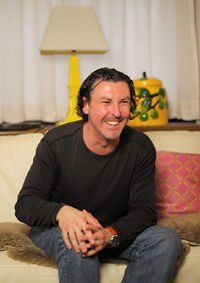 オーストラリアは200年前に誕生しました。汽車、車、飛行機などの移動手段がすぐに登場したため、オーストラリア人は簡単に移動することができました。これは、それぞれの地域で異なった言葉を生み出して行く機会が与えられなかったということ意味します。もちろん、地方には強いオーストラリア訛りがありますし、都会ではより標準的な言葉が話されます。でも、その出身地まで言い当てることはできません。言えるとしても、彼は都市出身、彼は地方出身、ということぐらいなのです。
オーストラリアは200年前に誕生しました。汽車、車、飛行機などの移動手段がすぐに登場したため、オーストラリア人は簡単に移動することができました。これは、それぞれの地域で異なった言葉を生み出して行く機会が与えられなかったということ意味します。もちろん、地方には強いオーストラリア訛りがありますし、都会ではより標準的な言葉が話されます。でも、その出身地まで言い当てることはできません。言えるとしても、彼は都市出身、彼は地方出身、ということぐらいなのです。
Australians came 200 years ago. And suddenly the trains, cars and airplanes came to the world, and Australians could move very quickly, which didn’t give us a chance to develop a different language in every area. Of course, the countryside of Australia is very strong Australian accent. The city is a little bit more standard. But I don’t know where they are from. All I can say is country and city, maybe.
[了]
◎英会話プライベートレッスンに役立つ英語表現46をブレンダン先生の声で
▽基本英文46
◎ブレンダン先生のETCの英会話プライベートレッスン・レポート(初級者編)
▽英語でピラティス指導できるようになりたい
◎ブレンダン先生ご出演のRadioETC/ポッドキャスティング
☆映画『ボビーとディンガン』でオーストラリア英語に挑戦!
▽How would you-?とHow do you-?の違い
▽natureとcharacterの違い
▽オーストラリア英語を学ぶ理由
▽オーストラリア英語の特徴~消える音、つぶれる音
▽オーストラリア英語の特徴~Rの発音
▽オーストラリアのスラング英語~mongrel
▽in a way の意味は
▽英会話上達の秘訣~質問力

